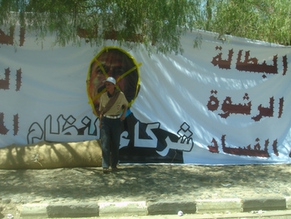|
World Jewish News

Anti-government demonstrators are demanding that Saleh, in power for 32 years, step down [Akram Shamhan]
|
Major Yemen tribes join protesters
28.02.2011, Israel and the World Pressure on Ali Abdullah Saleh, Yemen's president, to resign has increased after the leaders of two of the country's most important tribes abandoned the president and joined the anti-government movement.
Tribal leaders, including those of the Hashid and Baqil, pledged on Saturday to join protests against Saleh at a gathering north of Sanaa, the capital.
"I have announced my resignation from the General People's Congress in protest at the repression of peaceful demonstrators in Sanaa, Taez and Aden," said Hashid tribal chief Sheikh Hussein bin Abdullah al-Ahmar, in reference to the ruling party.
The Hashids are considered Yemen's most powerful tribal confederation and include nine clans, among them the Sanhan, long a bulwark of Saleh's regime.
The announcement was warmly received by a large crowd of tribesmen, including members of Yemen's second largest tribe, the Baqil, who gathered for the meeting, a tribal source told the AFP news agency.
The two tribes announced they would support the popular uprising against Saleh, who has refused to step down after three decades in power, to chants of "the people want the fall of the regime!"
Al Jazeera's Hashem Ahelbarra, reporting from Sanaa, said: "The al-Ahmar family is the tribal leadership of the Hashid tribe, and if the entire family decides to join the anti-government protests then that is bound to be the biggest blow to the Saleh government.
"If he [Saleh] loses Hashid, that will further erode the public support that he has enjoyed over the last three decades.
"Many of the members of this tribe are represented in the intelligence agencies, government, military and also embassies all over the world."
Friday's protests
Yemen has been swept up in protests inspired by the recent uprisings in Egypt and Tunisia. The demonstrators are demanding that Saleh, in power for 32 years, step down.
At least five people were killed during protests in the southern city of Aden on Friday.
Ahelbarra said: "There were clashes between anti-government protesters and security forces. And the government issued a statement saying that the activists and secessionists opened fire on the security forces."
However, pro-democracy activists told Al Jazeera that "they were marching on the streets of Aden when they were met with brutal force unleashed by security forces".
"Events in Yemen are taking a serious turn for the worse and the Yemeni security forces are showing reckless disregard for human life," said Philip Luther, Amnesty International’s deputy director for the Middle East and North Africa, in a statement on Saturday.
"The Yemeni authorities have a duty to ensure that those injured receive medical treatment. They must on no account block access to urgently needed medical assistance, particularly when people’s lives may be at risk."
Tens of thousands of both supporters and opponents of Saleh also held rival rallies in Sanaa on Friday.
Protesters outside Sanaa University chanted: "The people demand the downfall of the regime."
About 4km away, loyalists shouted support for the president, who they described as holding the fractured and impoverished tribal country together. "The creator of unity is in our hearts. We will not abandon him," they chanted.
'Anarchy and killing'
Twenty-four people have died in the past nine days in a sustained wave of nationwide anti-Saleh protests. The embattled president has said he will not give in to "anarchy and killing".
Saleh, a US ally against a Yemen-based al-Qaeda wing that has launched attacks at home and abroad, is struggling to end the protests flaring across his impoverished country.
He is also trying to maintain a shaky truce with northern Shia Muslim fighters and contain a secessionist uprising in the south against northern rule.
Salah has offered to step down before elections scheduled for 2013 and state news agency Saba said he has assigned a committee headed by Ali Mohammed Megawar, the prime minister, to open a dialogue with protesters to hear their demands.
Al Jazeera
|
|
